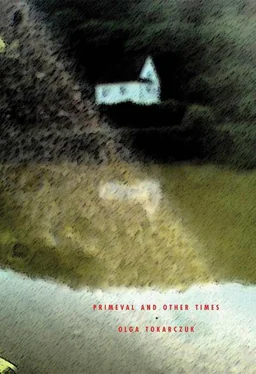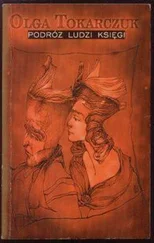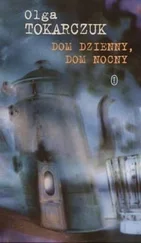The child plopped into Kucmerka’s hands and Genowefa fainted again. Kucmerka attended to the child. It began to whine softly.
“Daughter?” asked Genowefa, coming round.
“Daughter? Daughter?” the midwife mocked her. “You’re a wimp, not a woman.”
The breathless women entered the house.
“Go and tell Michał he has a son,” Kucmerka ordered them.
They gave the child the name Izydor. Genowefa was in a bad way. She had a fever and couldn’t feed the baby. She kept shouting things in her delirium, saying they had switched her child for another. When she came to, she immediately said: “Give me my daughter.”
“We have a son,” Michał answered her.
Genowefa spent a long time examining the baby. It was a boy, large and pale. He had thin eyelids, with small blue veins showing through them. His head looked too big, too solid. He was very restless, crying and squirming at the slightest sound, and screaming so hard that it was impossible to quieten him. He was woken by the floor creaking or the clock ticking.
“It’s because of the cow’s milk,” said Kucmerka. “You must start feeding him.”
“I haven’t got any milk, I haven’t got any milk,” groaned Genowefa in despair. “We must find a wet nurse quickly.”
“Cornspike has given birth.”
“I don’t want Cornspike,” said Genowefa.
A wet nurse was found in Jeszkotle. She was a Jew. One of her twins had died. Michał had to go and fetch her twice a day by horse and cart.
Even when fed on woman’s milk, Izydor went on crying. For nights on end Genowefa would carry him in her arms, to and fro, about the kitchen and the living room. She also tried going to bed and ignoring the crying, but then Michał got up and very quietly, to avoid disturbing Misia’s sleep, wrapped the baby in a blanket and took him outside, under the starry sky. He would take his son to the Hill or along the Highway towards the forest. The child would be calmed by the rocking motion and the scent of the pine trees, but as soon as Michał came home and crossed the threshold, he would start to cry again.
Sometimes, pretending to be asleep, through half-open eyes Michał would watch his wife as she stood over the cradle and gazed at the child. She looked at him coldly and dispassionately, as if at a thing, an object, not a human being. As if sensing this gaze, the child would cry even louder, even more mournfully. Something was going on in the heads of mother and child, Michał didn’t know what, but one night Genowefa whispered to him confidentially:
“That’s not our child. That’s Cornspike’s child. Kucmerka told me ‘daughter,’ I remember that. Then something must have happened, Cornspike could have beguiled Kucmerka, because when I woke up it was a son.”
Michał sat down and lit the lamp. He saw his wife’s tear-stained face.
“Genowefa, you can’t think like that. That’s Izydor, our son. He looks like me. And we wanted a son, didn’t we?”
Something of this short, nocturnal conversation remained in the Niebieskis’ house. Now they both watched the child. Michał sought similarities. Genowefa surreptitiously checked her son’s fingers, examined the skin on his back and the shape of his ears. And the older the child got, the more proof she found for the idea that he was not their offspring.
On his first birthday Izydor still didn’t have a single tooth. He could hardly sit up and hadn’t grown much. It was clear that all his growth was going to his head – though his face remained small, Izydor’s head was growing, lengthways and widthways from the line of his brow.
In the spring of 1930 they took him to Taszów, to the doctor.
“It might be hydrocephalus, and the child will most probably die. There’s no cure for it.”
The doctor’s words were a magic spell that awoke the love in Genowefa that had been frozen by suspicions.
Genowefa loved Izydor the way you love a dog or a crippled, helpless small animal. It was the purest human compassion.
THE TIME OF SQUIRE POPIELSKI
Squire Popielski had a good time for business. Every year he acquired one more fish pond. The carp in these ponds were huge and fat. When their time came, they crowded into the net of their own accord. The squire loved to walk along the dikes, circling right round them, gazing into the water, and then into the sky. The abundance of fish soothed his nerves, and the ponds allowed him to get a grip on the sense of it all. The more ponds, the more sense. Busy with the ponds, Squire Popielski’s mind had a lot to do: he had to plan, ponder, count, create, and devise. He could think about the ponds the whole time, and then his mind didn’t wander off into cold, dark areas that dragged him down like a quagmire.
In the evenings the squire devoted his time to his family. His wife, as slim and fragile as a reed, would shower him in a hail of problems, trivial and unimportant, as it seemed to him. About the servants, the banquet, the children’s school, the car, money, the shelter. In the evening she sat with him in the living room and drowned the music from the radio with her monotonous voice. Once the squire had been happy when she massaged his back. Now once an hour his wife’s slender fingers turned a page of the book she had been reading for a year. The children were growing, and the squire knew less and less about them. The presence of his oldest daughter, with her disdainfully pouting lips, made him feel uncomfortable, as if she were someone alien, or even hostile to him. His son had become reticent and timid, and never sat on his knees or tugged his moustache any more. His youngest son, the pampered favourite, tended to be wayward and had fits of rage.
In 1931 the Popielskis and their children went to Italy. On returning from the holiday Squire Popielski knew he had found his passion – in art. He started collecting albums about painting, and then spent more and more time in Kraków, where he bought pictures. Moreover, he often invited artists to the manor, held discussions with them, and drank. At dawn he would take the entire company to his ponds and show them the olive-green hulks of the enormous carp.
The next year Squire Popielski fell violently in love with Maria Szer, a young painter from Kraków, a representative of futurism. As happens in sudden loves, meaningful coincidences started appearing in his life, chance common acquaintances, and the necessity for sudden journeys. Thanks to Maria Szer, Squire Popielski fell in love with modern art. His lover was like futurism: full of energy, crazy, though in certain matters stone cold sober. She had a body like a statue – smooth and hard. Strands of her fair hair stuck to her brow as she worked on an enormous canvas. She was the opposite of the squire’s wife. Beside her, his wife was like an eighteenth-century classical landscape: full of details, harmonious, and painfully static.
In the thirty-eighth year of his life Squire Popielski felt as if he had discovered sex. It was wild, crazy sex, like modern art, like Maria Szer. By the bed in her studio stood an enormous mirror, which reflected the entire transformation of Maria Szer and Squire Popielski into a woman and a man. It reflected the rumpled bedding and the sheepskins, and the naked bodies smeared in paint, and the grimaces on their faces, and their naked breasts, and their bellies, and their backs with smudged lipstick streaks.
On his way back to the manor from Kraków in his new car, Squire Popielski would elaborate plans to escape to Brazil, or to Africa with his Maria, but once he crossed the threshold he was happy to find everything in its place, safe and permanent, reliable.
After six months of madness Maria Szer informed him that she was leaving for America. She said everything was new there, full of vigour and energy, and that there you could create your own life, like a futurist painting. After her departure Squire Popielski caught a strange illness with lots of symptoms, which to simplify matters was called arthritis. For a month he lay in bed, where he could surrender to suffering in peace.
Читать дальше












